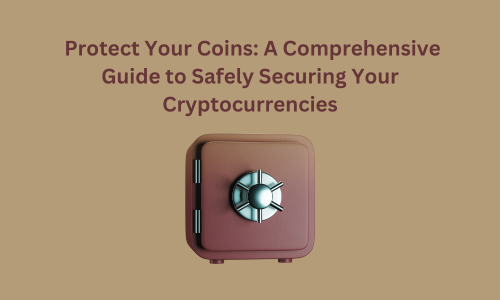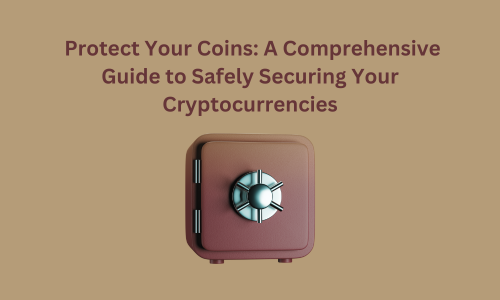


In the ever-evolving world of cryptocurrencies, security is more than just a priority—it's a necessity. With the surge in digital assets comes an increase in cyber threats, making it crucial for every crypto holder to understand how to protect their investments. Unlike traditional banking systems, cryptocurrency transactions are irreversible, and once your assets are gone, they’re likely gone for good. This guide will walk you through the essential steps to securely manage your cryptocurrencies, helping you stay one step ahead of potential threats.
Before diving into security strategies, it’s vital to understand the common threats that could jeopardize your digital assets:
Phishing Attacks: Hackers often use deceptive emails or fake websites to trick users into revealing their private keys or login credentials. Once they have this information, they can easily access your wallet and drain your funds.
Malware and Keyloggers: Malicious software can be secretly installed on your device to monitor and capture your keystrokes, including sensitive information like passwords and private keys.
Exchange Hacks: Even the most reputable cryptocurrency exchanges are not immune to hacks. If you leave your funds on an exchange, they could be vulnerable to large-scale attacks.
SIM Swapping: Cybercriminals can hijack your phone number by convincing your mobile provider to transfer your SIM card to a new device. With control over your phone number, they can bypass SMS-based two-factor authentication (2FA) and access your accounts.
Rug Pulls and Scams: The crypto space is rife with fraudulent projects. Investors can lose their money in schemes where the developers disappear with all the funds after creating hype around a fake project.
Securing your cryptocurrencies requires a proactive approach. Here’s how you can safeguard your digital assets:
Use Hardware Wallets: A hardware wallet is a physical device that stores your private keys offline, making it nearly impossible for hackers to access them remotely. Popular choices include Ledger and Trezor. These wallets are considered the gold standard for crypto security.
Strong, Unique Passwords: Your first line of defence is a strong password. Use a combination of letters, numbers, and symbols, and avoid reusing passwords across different platforms. A password manager can help you generate and store complex passwords securely.
Enable Two-Factor Authentication (2FA): 2FA adds an extra layer of security to your accounts. Use an authenticator app like Google Authenticator or Authy instead of SMS-based 2FA to avoid the risk of SIM swapping.
Regular Backups: Backup your wallet’s recovery phrase and private keys regularly. Store these backups in multiple secure locations, such as a fireproof safe or a secure offline storage device. Never store them digitally or in the cloud.
Keep Software Updated: Ensure that your wallet software, antivirus programs, and device operating systems are up to date. Regular updates often include patches for security vulnerabilities.
Be Wary of Public Wi-Fi: Avoid accessing your crypto accounts over public Wi-Fi networks, which are often insecure and susceptible to man-in-the-middle attacks. If you must use public Wi-Fi, employ a virtual private network (VPN) to encrypt your connection.
If you use cryptocurrency exchanges for trading, follow these additional steps to protect your assets:
Choose Reputable Exchanges: Select exchanges that prioritize security, regulatory compliance, and offer insurance coverage for user funds. Research the exchange’s history and read reviews to ensure its credibility.
Avoid Storing Large Amounts on Exchanges: Only keep the amount you need for trading on the exchange. After completing trades, transfer your assets to a secure wallet.
Monitor Account Activity: Regularly check your account activity for any suspicious transactions. Set up alerts to be notified immediately of any unauthorized actions.
Phishing and scams are some of the most common ways users lose their cryptocurrencies. Here’s how to stay safe:
Identifying Phishing Attempts: Always double-check URLs before entering sensitive information. Be wary of emails or messages that urge immediate action or offer deals that seem too good to be true.
Avoiding Social Engineering Attacks: Scammers might try to gain your trust by impersonating someone you know or a reputable organization. Always verify identities through separate communication channels.
Verifying Smart Contracts and DApps: Before interacting with a smart contract or decentralized application (DApp), research its legitimacy. Use trusted platforms like Etherscan to review the contract’s code and check for audits.
For those with significant crypto holdings, consider implementing these advanced security measures:
Multi-Signature Wallets: Multi-signature wallets require multiple approvals before a transaction can be completed, adding an additional layer of security. This is particularly useful for businesses or shared accounts.
Cold Storage Solutions: Cold storage refers to keeping your cryptocurrencies in a wallet that is not connected to the internet. This method is ideal for long-term holdings, as it significantly reduces the risk of hacking.
Using a VPN: A VPN can obscure your online activities by encrypting your internet connection. This adds a layer of privacy and protects you from IP-based attacks when accessing crypto-related services.
Security Audits: If you hold large amounts of cryptocurrency, consider hiring professionals to conduct regular security audits. They can identify vulnerabilities in your security setup and recommend improvements.
While security practices are crucial, it’s also important to consider legal and insurance aspects:
Legal Protections and Recourse: Depending on your jurisdiction, you may have legal avenues to pursue if you fall victim to a hack or scam. Familiarize yourself with local laws and consider working with legal professionals who specialize in cryptocurrency.
Crypto Insurance: Some companies offer insurance policies that cover cryptocurrency assets. While still relatively rare, these policies can provide peace of mind, especially for large investments.
Despite your best efforts, there’s still a chance you could fall victim to a hack. Here’s what to do if that happens:
Immediate Steps: If you suspect a breach, act quickly. Disconnect your device from the internet, move any remaining funds to a secure wallet, and change all related passwords immediately.
Contacting Authorities: Report the incident to local authorities or a cybercrime unit, especially if significant amounts are involved. They may not recover your funds, but reporting helps track and combat cybercrime.
Learning from the Incident: After securing your remaining assets, take time to analyse what went wrong. Adjust your security practices accordingly to prevent future breaches.
Securing your cryptocurrencies is not just about using the latest tools, but also about staying vigilant and informed. By understanding the threats and adopting best practices, you can protect your digital assets from the ever-present risk of cyber attacks. In the world of crypto, security is an ongoing process—keep learning, stay updated, and always prioritize the safety of your investments.
Additional Resources
For further reading and tools to enhance your crypto security, consider the following resources:
By taking these steps, you’ll be well on your way to securing your cryptocurrencies and protecting your wealth in the digital age.
Disclaimer: This article is provided for informational purposes only. It is not offered or intended to be used as legal, tax, investment, financial, or other advice.
